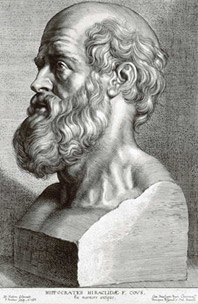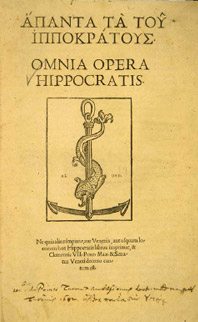The Hippocratic Oath Today
by Peter Tyson
A few years back, NOVA Online asked both doctors and
non-doctors to comment on the relevance of the Hippocratic
Oath, which most aspiring physicians take upon graduation from
medical school. Now, you can peruse their responses and also
add comments of your own. To give you a sense of the
controversial nature of the oath today, we suggest that you
first read the short article below, along with the classical
and modern versions of the Hippocratic Oath.
The Hippocratic Oath Today: Meaningless Relic or Invaluable
Moral Guide?
The Hippocratic Oath is one of the oldest binding documents in
history. Written in antiquity, its principles are held sacred
by doctors to this day: treat the sick to the best of one's
ability, preserve patient privacy, teach the secrets of
medicine to the next generation, and so on. "The Oath of
Hippocrates," holds the American Medical Association's Code of
Medical Ethics (1996 edition), "has remained in Western
civilization as an expression of ideal conduct for the
physician." Today, most graduating medical-school students
swear to some form of the oath, usually a modernized version.
Indeed, oath-taking in recent decades has risen to near
uniformity, with just 24 percent of U.S. medical schools
administering the oath in 1928 to nearly 100 percent today.
Yet paradoxically, even as the modern oath's use has
burgeoned, its content has tacked away from the classical
oath's basic tenets. According to a 1993* survey of 150 U.S.
and Canadian medical schools, for example, only 14 percent of
modern oaths prohibit euthanasia, 11 percent hold convenant
with a deity, 8 percent foreswear abortion, and a mere 3
percent forbid sexual contact with patients—all maxims
held sacred in the classical version. The original calls for
free tuition for medical students and for doctors never to
"use the knife" (that is, conduct surgical
procedures)—both obviously out of step with modern-day
practice. Perhaps most telling, while the classical oath calls
for "the opposite" of pleasure and fame for those who
transgress the oath, fewer than half of oaths taken today
insist the taker be held accountable for keeping the pledge.
Indeed, a growing number of physicians have come to feel that
the Hippocratic Oath is inadequate to address the realities of
a medical world that has witnessed huge scientific, economic,
political, and social changes, a world of legalized abortion,
physician-assisted suicide, and pestilences unheard of in
Hippocrates' time. Some doctors have begun asking pointed
questions regarding the oath's relevance: In an environment of
increasing medical specialization, should physicians of such
different stripes swear to a single oath? With governments and
health-care organizations demanding patient information as
never before, how can a doctor maintain a patient's privacy?
Are physicians morally obligated to treat patients with such
lethal new diseases as AIDS or the Ebola virus?
Other physicians are taking broader aim. Some claim that the
principles enshrined in the oath never constituted a shared
core of moral values, that the oath's pagan origins and moral
cast make it antithetical to beliefs held by Christians, Jews,
and Muslims. Others note that the classical Oath makes no
mention of such contemporary issues as the ethics of
experimentation, team care, or a doctor's societal or legal
responsibilities. (Most modern oaths, in fact, are
penalty-free, with no threat to potential transgressors of
loss of practice or even of face.)
With all this in mind, some doctors see oath-taking as little
more than a pro-forma ritual with little value beyond that of
upholding tradition. "The original oath is redolent of a
convenant, a solemn and binding treaty," writes Dr. David
Graham in JAMA, the Journal of the American Medical
Association (12/13/00). "By contrast, many modern oaths have a
bland, generalized air of 'best wishes' about them, being
near-meaningless formalities devoid of any influence on how
medicine is truly practiced." Some physicians claim what they
call the "Hypocritic Oath" should be radically modified or
abandoned altogether.
What is your opinion? What do you feel is the Hippocratic
Oath's relevance today? Is it a pointless anachronism or an
invaluable moral guide? Should aspiring doctors still be made
to take some version of the oath? If you're a doctor, would
you take the oath again? Why?
*Orr, R. D., N. Pang, E. D. Pellegrino, and M. Siegler. 1997.
"Use of the Hippocratic Oath: A Review of Twentieth Century
Practice and a Content Analysis of Oaths Administered in
Medical Schools in the U.S. and Canada in 1993."
The Journal of Clinical Ethics 8 (Winter): 377-388.




